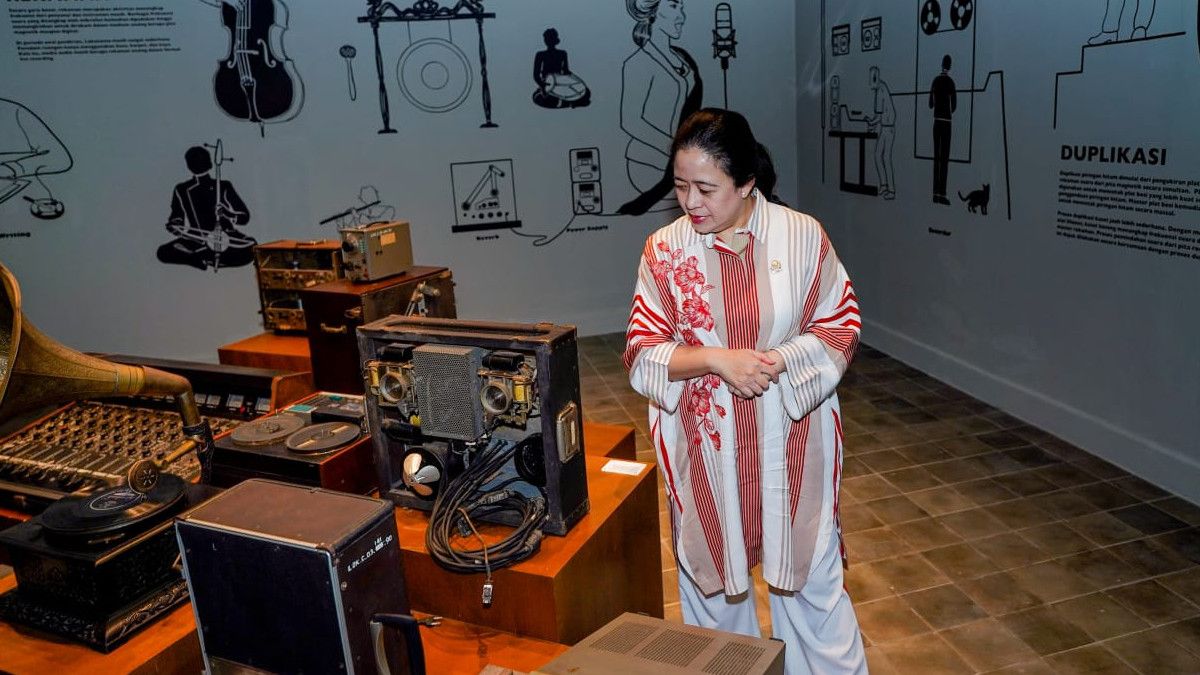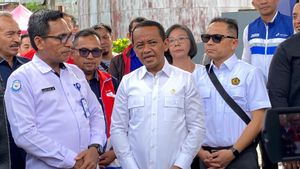JAKARTA - The Speaker of the House of Representatives, Puan Maharani, visited the Lokananta Museum in Solo, Central Java, which is the legacy of Indonesia's record industry. Lokananta, which is now rising from suspended animation, is expected to be a gathering place for young people so that the achievements of Indonesian music can be even more brilliant.
Puan came to the Lokananta Museum located on Jl. Ahmad Yani, Kerten, Laweyan, Solo, after welcoming the 2023 Indonesia ASEAN Para Games contingent who had just returned from Cambodia. He came to the newly revitalized Lokananta accompanied by the Deputy Mayor of Solo, Teguh Prakosa.
"Lokanata is a symbol of our history and musical civilization, which has contributed greatly to the journey of art and culture in Indonesia," said Puan, Saturday, June 10.
The Lokananta Museum is the first and only state-owned music company to have a large collection of legendary music with a record plate or ribbon cassette. Not only that, Lokananta also has a recording studio that can still be used today.
The recording studio at Lokananta still maintains analog production for its music, namely by producing music in a tape cassette format. Puan hopes that Lokananta can triumph again after being reactivated after being revitalized by the Government.
"This museum, as home to the oldest music recording in Indonesia, is a monument to our nation's astonishing diversity and creativity," said the first woman to serve as Chair of the Indonesian House of Representatives.
During her visit, Puan was invited to tour the museum guided by Artist Anggit Wicaksono who is also the caretaker of Lokananta. He visited a room featuring the timeline of Lokananta's history where in the room there was also a display set gamelan Lokananta Kyai Sri Kuncoro Mulyo.
This game is said to have existed since the time of Prince Diponegoro and was brought to Solo in 1937. Puan also saw a discography which is a collection of ancient historical local music disks.
There is also the diorama of the history of Gesang's work, the first grammar of the Bengawan Solo release era. Seeing this, Puan seems very happy especially when someone sings Bengawan Solo's song so that the atmosphere is getting more fluid.
"I hope that this increasingly beautiful Lokananta can become a gathering place for young people and become a symbol of the revival of the Indonesian record industry. The government must complete facilities so that Lokananta is more attractive to young people," said Puan.
After that, Puan visited the art installation showroom which was the temporary gallery of Lokananta Remastered. He also stopped at the installation made by Bottlesmoker with the Bung Karno era JBL set and then pressed the button playing beautiful music.
Visiting Lokananta is incomplete if you don't see the museum's legendary recording studio. Therefore, Puan visited the largest recording studio in Indonesia to see and witness its splendor.
Puan even had a photo in front of the recording kitchen that could be seen from behind the glass. In addition, he also visited a local Matalokal MSME kiosk at the Lokananta complex, then had a photobox with visitors.
"By visiting this place, I hope to reaffirm our commitment to protecting and promoting our cultural heritage," said Puan.
Puan emphasized the importance of preserving Indonesia's cultural heritage. Including, said Puan, the recording studio in Lokananta is very important in the history of Indonesian music because it has recorded many musical works, from traditional to contemporary from various regions.
"Art and culture are an integral part of our national identity. They remind us of where we come from and give us views on where we might go," said Puan.
The Lokananta Museum was founded in 1956 and received its name from the Lokananta recording studio located in the same building. Lokananta is now about six decades old, a long span of time for a music label that is now under the tutelage of the State Printing Corporation of the Republic of Indonesia.
After the suspended animation, Lokananta has now been beautified and is no longer just a museum. Lokananta will be used as a music ecosystem for artists by involving communities, returning Lokananta brands as music centers, including recordings and production of disks.
Lokananta will also develop retail local brands as well as become modern recording studios, indoor and outdoor music performances, and sales of music merchandise. Puan was amazed and considered Lokananta to be a music and cultural lover paradise.
According to Puan, respecting cultural heritage is not only done with nostalgia, but also must be sustainable. For this reason, she emphasized the importance of maintaining artistic and cultural heritage so that it can be forwarded to future generations.
"We at the DPR believe that our appreciation and understanding of history and culture can help form a better and more inclusive future for all of us," said Puan.
The English, Chinese, Japanese, Arabic, and French versions are automatically generated by the AI. So there may still be inaccuracies in translating, please always see Indonesian as our main language. (system supported by DigitalSiber.id)













